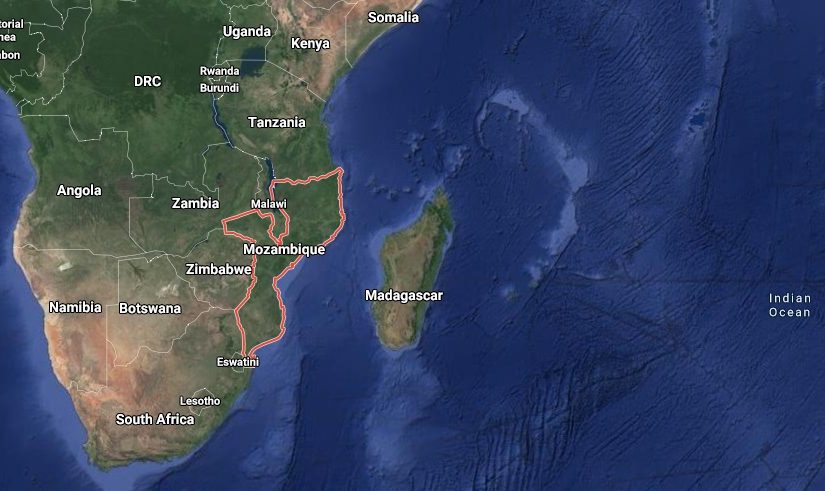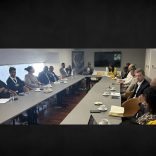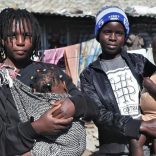Mozambique: RUSI and Embassy of the Kingdom of Norway in Maputo present OCTA project findings
Mozambique: Lessons for Moz from Afghanistan: talk to men with guns – By Joseph Hanlon

Image: Google Maps
In this issue
Lessons from Afghanistan
Jonathan Powell: talk to the men with guns
Paul Rogers: military response won’t work
Negotiate now, when the opponent is weak
and Covid-19
Mia Couto: remembering alternatives
Other news
10-year sentence for ex-transport minister
- ‘Wars don’t end for good until you talk to the men with the guns,’ writes Ireland negotiator, citing Mozambique
“We have to learn the lessons from Afghanistan elsewhere in the world. How are we going to deal with the armed Islamist groups across northern Africa, in Somalia (another ‘forever war’), in Mozambique and in Nigeria? Are we going to continue kidding ourselves that we can defeat them by military means alone?” asks Jonathan Powell. He was Tony Blair’s chief of staff from 1995 to 2007, and was chief government negotiator on Northern Ireland and thus one of the main architects of the peace deal there. His 2014 book Talking to Terrorists: How to end armed conflicts specifically cites Mozambique’s negotiation with Renamo, ending in the Rome Peace accord.
In a London Guardian (10 Sept) article headlined “The lesson of 9/11: we should have talked to our enemies”, Powell says “the principal failure in Afghanistan was to fail to learn, from our previous struggles with terrorism, that you only get to a lasting peace when you have an inclusive negotiation – not when you try to impose a settlement by force. In Northern Ireland we tried making peace at Sunningdale in 1973, in the Anglo-Irish agreement in 1985, and in the Downing Street Declaration in 1993 – each time excluding Sinn Fein, and each time we failed to end the Troubles. Having tried everything else, we finally had to talk to the men with guns, and that is why the Good Friday agreement succeeded.” http://bit.ly/Moz-Af-Powell
“The lesson from Afghanistan is as clear as it was from Northern Ireland. If we ever want to secure lasting peace then we have to engage with our enemies, not just with those we like,” Powell concludes. “Wars don’t end for good until you talk to the men with the guns.”
Paul Rogers: A war of the marginalised against the strong, where military response won’t work
Paul Rogers, the highly respected Professor of Peace Studies at University of Bradford, also cites Mozambique, DRC and various other small wars in his response to the US loss of the Afghanistan war.
After 9/11, “the US military and most analysts around the world missed the significance of a new phenomenon, the rapidly improving ability of the weak to take up arms against the strong.” Second, there was a “fundamental flaw” in the analysis, “the belief that the main security concern must be with an extreme version of Islam…. The war on terror is better seen as one part of a global trend which goes well beyond a single religious tradition – a slow but steady move towards revolts from the margins.” The Conversation, 10 Sep http://bit.ly/Moz-Af-Rogers
In his much reprinted 2010 book Losing Control: Global Security in the 21st Century, Prof Rogers wrote “What should be expected is that new social movements will develop that are essentially anti-elite in nature and will draw their support from people, especially men, on the margins. In different contexts and circumstances, they may have their roots in political ideologies, religious beliefs, ethnic, nationalist or cultural identities, or a complex combination of several of these. They may be focused on individuals or groups, but the most common feature is an opposition to existing centres of power … What can be said is that, on present trends, anti-elite action will be a core feature of the next 30 years – not so much a clash of civilisations, more an age of insurgencies.”
“The primary factors in global insecurity [are] a combination of increasing socioeconomic divisions and environmental limits to growth coupled with a security strategy rooted in preserving the status quo”, he writes. Two decades after writing Losing Control, “socioeconomic divisions have worsened, the concentration of wealth has reached levels best described as obscene and has even increased dramatically during the COVID-19 pandemic, itself leading to food shortages and increased poverty.
“Meanwhile climate change is now with us, is accelerating towards climate breakdown with, once again, the greatest impact on marginalised societies. It therefore makes sense to see 9/11 primarily as an early and grievous manifestation of the weak taking up arms against the strong, and that military response in the current global security environment woefully misses the point.”
Comment
Negotiate when the opponent is weak
The end of this war in Afghanistan has led civil war scholars to point to two key lessons on how wars end successfully. First is to negotiate with the enemy when it is weak and ready to accept a deal, and second is to give them enough to resolve grievances and make them a serious part of the settlement.
This comes to the fore because in 2001 when the US military swept to victory in Afghanistan, the Taliban wanted to negotiate, but then President George Bush refused to “talk to terrorists” and the Taliban was excluded from the December 2001 Bonn conference to shape the new Afghanistan. Excluded from any official role, the Taliban regrouped, returned to war, and won total victory 20 year later.
Mozambique is the most widely cited counter example, negotiating with Renamo to end a decade long war. Renamo were terrorists by any definition, kidnapping, killing, burning people alive in buses. But in 1990 they were at their weakest. The end of the cold war meant they lost their external support, and a severe drought made it impossible to feed their fighters. In Rome peace talks, Renamo accepted multiparty elections and becoming the main opposition.
But Renamo returned to sporadic war through 2013-8, which raises the second point. Paul Collier, who later became famous for his book The Bottom Billion, in 1994 was writing about the end of civil wars and stressed “The winner is obviously regarded as partisan. Since this perception motivates the potential threat to the government, public gestures of redistributive expenditure are needed to counter it. … The conversion of swords into plough-shares [requires] a visible redistribution of plough-shares to the potential enemy.” For peace to be maintained requires a “re-distributive expenditures in favour of the losers.” http://bit.ly/Collier-1994-plough (Chapter 1)
As well as money, this applies to status and power. Frelimo was prepared to talk to terrorists, but not make concessions to them. Senior Renamo fighters integrated into the army and police were largely marginalised. Renamo did not benefit from privatisation, jobs, and so on, which were reserved for Frelimo. So Renamo saw themselves as outsiders, and never fully demobilised – keeping both seats in parliament and an armed militia. Even to try to get fair elections, Renamo head Afonso Dhlakama felt he had to go back to war.
The lessons of history suggest this is the best time to negotiate with the men with guns and machetes in Cabo Delgado, when they are weak and dispersing. But the low level of fatalities so far shows they are simply returning home or breaking into small groups. As in Afghanistan, they will regroup and return to war. This is the time to talk and to reintegrate the insurgents – with “ploughshares” in the form of jobs, and a visible end to discrimination and marginalisation.
George W Bush can say as US president he won the war in Afghanistan in 2001 – but he lost the peace. With Rwandan troops President Nyusi will be able to say he is winning the war in Cabo Delgado, and perhaps ride in triumph through the Frelimo Congress next year. But if he fails to talk to the insurgents, or treats them as Renamo was treated, be may lose the peace. But as with George W Bush, Nyusi can bask in glory and renewed fighting will be a problem for a future president. jh
(“They shall beat their swords into ploughshares, and their spears into pruning hooks; nation shall not lift up sword against nation, neither shall they learn war any more” comes from the Old Testament book of Isaiah (2:3-4). The “plough share” is the metal blade of the plough that cuts into the earth. But the book of Isaiah also contains a warning – Isaiah’s son is named Maher-shalal-hash-baz, which means “rush to plunder”.)
Comment: Would the IMF allow it? Would the IMF allow the extra expenditure a Paul Collier style settlement would require? IMF Covid-19 loans suggest not, according to an Oxfam (11 August) paper. “While the IMF’s initial advice to governments was to spend as much as required to mitigate the severe impacts of the crisis, Oxfam’s research finds that the IMF is encouraging countries to go down the path of austerity after the pandemic subsides.” Mozambique is one of the countries that had to agree resumed austerity post-Covid-19, including further cuts to wages and removing VAT exemptions. The report is “Adding fuel to fire: How IMF demands for austerity will drive up inequality worldwide”: http://bit.ly/Oxfam-IMF-Covid
Seriously redressing the grievances and poverty in Cabo Delgado will require significant spending on jobs and education. It seems highly unlikely that the gas and mineral companies, or the Frelimo oligarchs, will pay the bill. Current IMF austerity policy will increase the poverty and marginalisation at the root of the war. And two decades of experience shows the private sector cannot or will not reduce poverty. Stopping a return to war will require a big increase in state spending. Will the IMF allow it? Or will the World Bank and the big donors provide the money without an IMF programme?
Across the world, “don’t talk to terrorists” plus austerity has led to endless civil wars. Is that inevitable in Cabo Delgado as well? jh
- Mia Couto: Enforced forgetfulness and remembering that there are alternatives
“As a writer, I am fascinated by the phenomenon of forgetfulness,” notes Mia Couto. But he is also a biologist and environmental scientist and he was giving a speech to the National Institute of Health annual scientific conference on 8 September. “It is worth revisiting the year 1918, the year of the so-called Spanish Flu. In three successive outbreaks the Spanish Flu killed 50 million people worldwide in one year alone (ten times more than Covid-19 has killed so far).”
And that flu had a serious effect in Africa. “In September 1918 two warships from England arrived in Cape Town carrying 2000 black South African soldiers from the battlefields of France and Belgium. Some dozens of these soldiers were infected and were sent back to their homelands. The result was: in less than two months 300 000 South Africans died. (Let us remember that in two years of COVID 19, 85 000 South Africans died),” Couto adds that Lhanguene cemetery in Maputo “was opened in order to attend the mass burials of the many hundreds of indigenous people who were victims of the Spanish flu.”
That pandemic was largely forgotten, in part intentionally. Couto points out “this pandemic came along with the First World War which caused the death of another 38 million people. European governments decided to hide the brutal reality of this disease so as not to demoralise either the soldiers at the front or the families who hoped these soldiers would return home.”
“The name ‘Spanish Flu’ does not come from the place where the contagion started, but from the fact that the Spanish press gave special attention to the disease. Spain was not involved in the war, the press in Spain did not suffer from censorship regarding the disease.”
Couto concludes by saying we are being pushed toward “what we insist on calling the ‘new normal’, which will largely be a continuation of the ‘old abnormal’.” And we are being pressed to “forget” that there are alternatives to the “old abnormal”. He cites a letter from a hundred African intellectuals and artists sent to the continent’s political leaders in April 2020.
This letter suggested that we should stop seeing Africa as an eternal victim, as a continent whose survival depends on the compassion of others. African intellectuals and artists called for radical ruptures in the forms of governance of our countries, Couto writes.
“Africans should stop measuring the progress of our countries by indicators dictated by the so-called ‘donor countries’, such as economic growth rates. Instead, they should invest heavily in public education and health policies that do not serve only a small minority that is more concerned with stealing State property than with promoting a better future. A few years from now the big question will not be whether we will continue to wear masks and will need new vaccines. The big question will be whether we will have schools with water and toilets, whether we will have better hospitals, better public transport and a better life for the great majority of our people. ”
“Fundamental changes will be needed,” Couto concludes. “Either we all change or there will be no future for anyone. In this sense, the future is similar to the vaccine. Either there is a future for all or we will all be defeated by the past.”
“Historia de um esquecimento”, by Mozambique’s best writer, in Portuguese only, is published by Carta de Mocambique (13 Sep) on https://cartamz.com/index.php/blogs/item/8837-historia-de-um-esquecimento
Other news
- Former Transport Minister jailed for 10 years for airplane bribe
Paulo Zucula, former Minister of Transport, was sentenced to 10 years in prison for bribes relating to the purchase of three aircraft from Brazilian Embraer for Mozambique Airlines (LAM) in 2008. The Maputo City Judicial Court today (13 Sep) also sentenced the former manager of Sasol in Mozambique, Mateus Zimba, to 10 years in prison. A third defendant, the former CEO of LAM, Jose Viegas, was acquitted because the criminal proceedings against him were already time-barred, and should have been brought by 2013. (Carta de Mocambique on-line 13 Sep)
LAM acquired three Embraer 190AR aircraft under a contract signed in 2008. The Public Prosecutor said Zucula received $430,000 and Zimba $370,000. Embraer admitted bribes in a US court. To cover the cost, the price of each aircraft was raised from $32 mm to $32.7 mn. (AIM 20 Apr)
One plane crashed in Namibia in November 2013, apparently a pilot suicide. The other two are still in service, but LAM is selling them in an attempt to standardise its fleet, according to the director of the government’s Institute for the Management of State Holdings (IGEPE), Raimundo Matule. Matule said it made no sense for a company as small as LAM to operate aircraft made by three different companies – the other LAM aircraft operating scheduled flights are Boeing 737s, and the Canadian Bombardier Q400. Running an airline with several different makes of plane, he added, leads to high costs in maintenance and acquiring spare parts. (Noticias 14 June).
- Comments from our readers
Still more on 7,427 bottles of wine being sent to the Presidencia on a chartered plane from France, according to a message sent by Privinvest’s Boustani on 13 March 2013. The suggestion in the previous issue was that bottle of wine is code for $1000, and $7.5 million would fit in three suitcases and weigh 70 kg. But 7,427 bottle still seems odd. So another reader notes Boustani pays in Euros, and at the trial last week it was noted that President’s secretary received €877,500 from Boustani. In fact, in March 2013 the EUR/USD exchange rate was around 1.28 which means that €7.427 mn would equal $9.5 mn. So the bribe would be calculated in USD and paid in EUR, notes our reader. $ and € notes weigh about the same, so €7.5 mn in €100 notes would be about 75 kg. But in 2013 there were still €200 and €500 notes, which had been printed at the time the Euro was first introduced in 1999 precisely to try to capture the large amounts of illegal cash transactions (because the largest US note is $100). So €7.5 mn in €500 notes would only weigh 15 kg and would indeed fit in two briefcases. So the bribe was $9.5 mn, but paid in €uros. And the bribe to Innes Moiane, President Guebuza’s secretary, was a much neater $1.1 mn.
By Joseph Hanlon












Leave a Reply
Be the First to Comment!
You must be logged in to post a comment.
You must be logged in to post a comment.